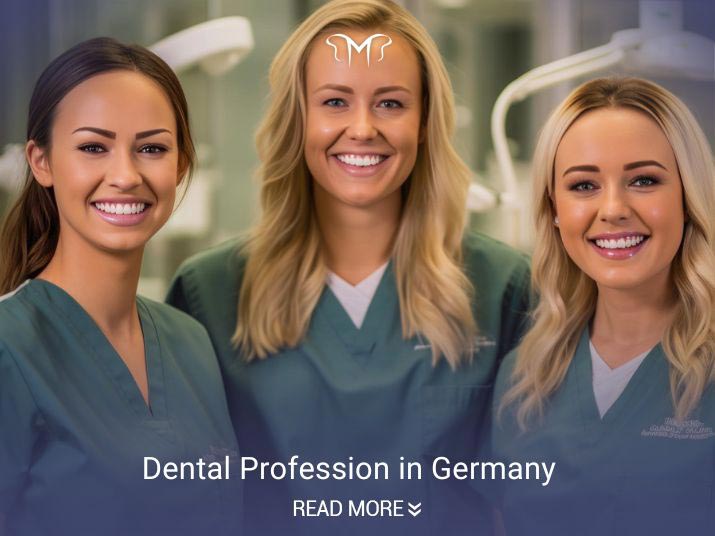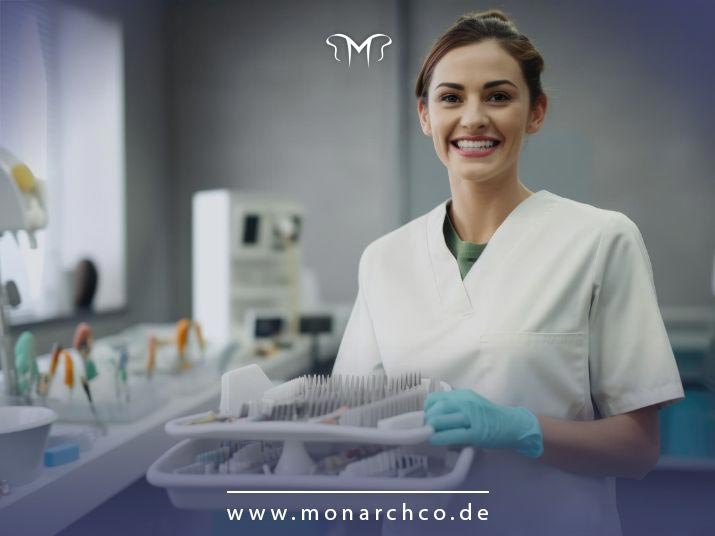
Overview of Dental Profession in Germany
Germany faces a severe shortage of physicians, dentists, nurses, and healthcare professionals overall. Given the importance of the dental profession in Germany and the country's extensive need for dental specialists, this article examines the immigration conditions for dentists to Germany, the migration process, and other related topics in the dental profession in Germany. Dentists seeking employment in Germany must obtain a state-approved license known as "Approbation" or a professional permit. These licenses are issued by the relevant authorities in each German state responsible for verifying the credentials of immigrant dentists. For more information on the conditions and details of the dental profession in Germany, please read to the end of the article.
Conditions for Immigration for Dental Profession in Germany
If you intend to immigrate for a dental profession in Germany and wish to work as a dentist in this country, you must apply for a dental license in Germany. To obtain a dental license in Germany or "Approbation," you must meet the following conditions:
- You must hold a degree in dentistry.
- You must have a treatment license from the medical authority of your home country.
- Your dental education must be equivalent to dental education in Germany.
- For immigration to some German states, you will need to provide a certificate of physical and mental health.
- You must improve your German language skills and provide the required certificate.
If your documents are not equivalent to dental education documents in Germany, you will need to have them recognized. The decision to recognize your dental degree and issue a medical or professional permit for the dental profession in Germany will be made by the relevant authorities in each federal state in Germany. Since dental education documents from countries outside the European Union, including Iran, require recognition, we recommend that you contact Monarch experts and receive the necessary guidance in this regard before taking any action.
Read more: All about laboratory science in Germany

Stages of Immigration for the Dental Profession in Germany
Individuals seeking to obtain a dental profession in Germany must go through several stages. These stages are as follows:
1. In the first step, try to start learning the German language and obtain an official certificate.
2. If you intend to personally pursue a dental profession in Germany, search for available positions in dental professions in Germany through institutions or job portals, and apply for your ideal position. It is worth mentioning that if desired, you can receive assistance for obtaining a dental profession in Germany, including some necessary steps and services after arriving in Germany, from Monarch Migration Institute.
3. After receiving a job offer, you must apply for a job offer visa.
4. After the embassy interview and traveling to Germany, participate in the specialized language exam.
5. Participate in the professional dental exam, known as "kenntnisprüfung."
6. If you successfully complete the previous stages, you can proceed to obtain a license for the dental profession in Germany.
Credential Equivalency for the Dental Profession in Germany
As mentioned, if you intend to pursue a dental profession in Germany and work as a dentist in the country, you must have your educational credentials equivalently recognized. To do this, you need to gather your educational documents along with the relevant details and send them to the Chamber of Dentists in Berlin. The Berlin Dental Association will decide on the equivalence of your educational documents. If your submitted documents do not meet the necessary equivalence with German educational documents, you will need to participate in the specialized German language exam and the medical knowledge exam and achieve a passing score. The medical knowledge exam is one of the required exams for the dental profession in Germany, usually conducted orally and typically lasting for 30 minutes. You will be allowed to participate in this exam a maximum of two times, and no more than that.

Application for Professional License for the Dental Profession in Germany
After your dental credentials have been evaluated and equivalently recognized, the next step is to participate in the specialized medical language course known as "Fachsprachprüfung." The medical language course usually lasts between 2 to 4 months, and at the end of the course, you will need to pass a specialized language exam. It's important to note that passing this stage requires successful performance in the exam. The second stage involves preparing for and participating in the "kenntnisprüfung" exam. As mentioned, this exam is the professional dental exam that evaluates your skills and expertise in the field for obtaining a dental profession in Germany. There are two ways to prepare for this exam:
-
Participating in preparatory courses and training for the exam.
-
Finding a position as an assistant or undergoing Hospitation in Germany. By choosing this option, you will gain the necessary readiness for the exam through practical work and patient interaction.
Once you have successfully completed both of the mentioned exams, you can apply for a professional license for the dental profession in Germany. Based on our experience during this period, we must say that as an international dentist, you have a very good chance of finding a suitable job opportunity in Germany. However, to obtain a dental profession in Germany, you must be a graduate dentist in your country and have achieved a German language certificate of B2 level or higher.
Required Documents for Applying for a Professional License for the Dental Profession in Germany
Individuals intending to obtain a professional license for the dental profession in Germany require certain documents. The documents that need to be collected for this purpose are as follows:
- Identification documents (ID card, valid passport, etc.)
- German language certificate B2 level or higher
- Graduation certificate
- Internship certificate and work experience
- Professional qualification certificate
- Certificate of good conduct
- Certificate from the medical association indicating no professional misconduct in dentistry
- List of insurance records
- If applicable, additional educational documents and a copy of the work permit
- Health and good conduct certificate (depending on the state of preference)

Obtaining a Visa for Dental Profession in Germany
Individuals intending to migrate and work as dentists in Germany must apply for a visa at the German embassy. To obtain a visa, you need to collect some documents, including:
- Completion of the visa application form
- Two passport-sized photos
- Valid passport
- Presentation of the residential address, driver's license, etc., in your name
- Submission of a job offer or employment contract with a German employer along with details
- Comprehensive and updated resume
- Health insurance (What is student insurance in Germany and what are its types?)
- Motivation letter
- Certificate of good conduct
- Proof of financial stability
- Documentation of visa fee payment, etc.
Benefits of the Dental Profession in Germany
Before making a final decision to migrate to Germany and work as a dentist in this European country, make sure to thoroughly examine all aspects. Considering that the dental profession in Germany is one of the in-demand occupations, numerous job opportunities are usually available. Therefore, working as a dentist in Germany comes with several advantages. Below, we highlight some of the main benefits of the dental profession in Germany:
- Ideal salary (minimum of 6000 to 10000 euros per month)
- Possibility of obtaining permanent residency in Germany after 5 years of work and living
- Living in a European country with high standards
- Having an ideal job with very high job security
- Reasonable working hours (maximum of 40 hours per week)
- Ensuring the future of dentists through the pension system in Germany
- High standards of medical care and advanced, up-to-date equipment
- Providing ample space for education and further specialization
By examining these factors, you can gain a clearer understanding of the opportunities, work processes, and advantages of the dental profession in Germany, enabling you to make an informed decision regarding career migration to this country.
Frequently Asked Questions
What is the income for a dental profession in Germany?
The dental profession in Germany is one of those occupations that offers a good and ideal income. The average salary for a dental profession in Germany ranges from 120 to 171 euros, or in other words, 58 euros per hour.
Can permanent residency in Germany be obtained with a dental profession?
Yes, individuals who succeed in working as dentists in Germany can apply for permanent residency in Germany after 5 years of work and activity in the country.
What are the steps required to obtain a dental profession in Germany?
To work as a dentist in Germany, you need to pass two exams (Approbation and Medical Professional License). If you have your credentials recognized, obtained at least a B2 level of German language proficiency, and successfully pass these two exams, you can apply for a dental profession in Germany.


